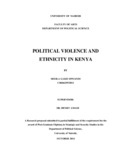| dc.description.abstract | After the Cold War and the transition towards democracy, inter-state conflict
became prevalent, especially in Africa. Kenya has experienced ethnic political violence
around election periods. The study explored the nuanced relationship between ethnicity
and political violence.
The study examined secondary data on ethnicity, politics, democratic transition
and political violence to understand the nature of recurrent political violence in Kenya.
The study found that in periods of political competition such as elections, political elites
mobilize Kenyans along ethnic lines, which are perceived to be established voter blocs to
ensure a victory to the highest office. The deliberate use of ethnicity is in line with the
instrumentalist theory.
The study concluded that because ethnic mobilization can be deemed a logical
calculation to ensure a win by a Kenyan presidential candidate, it is not a situation that
would be easy to change. However, political stability can be achieved by developing
cross-cutting loyalties such as associations with integrative mature political parties, the
promotion of national identity and addressing the structural problems such as inequity
and disparate access to opportunity. | en_US |

